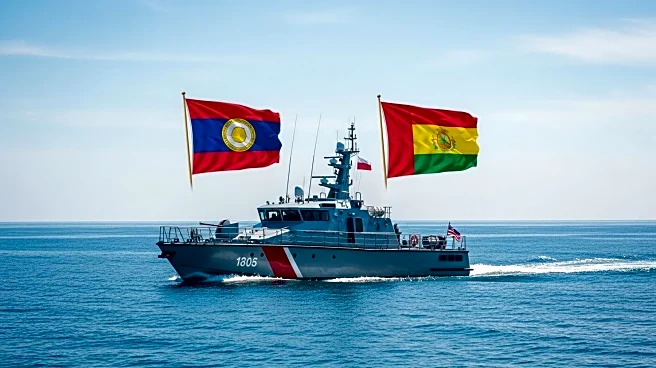What's Happening?
The Australian Border Force, Australian Federal Police, Queensland Police Service, and Papua New Guinea authorities have successfully completed a Joint Cross Border Patrol in the Torres Strait. This operation, conducted from September 22 to 27, involved visits to communities in Daru, Sigabadaru, and Ture Ture in PNG, as well as Saibai and Boigu Islands in the Torres Strait. The patrol is part of a collaborative effort to protect the border from threats such as drugs and firearms trafficking, people smuggling, and illegal foreign fishing. The initiative underscores the strong partnership between agencies on both sides of the border, aiming to support local communities and ensure secure movement of legitimate trade.
Why It's Important?
The joint patrols between Australia and Papua New Guinea are crucial for maintaining border security and combating transnational criminal activities. These efforts help to deter and disrupt illegal activities that pose risks to communities and economies in the region. By strengthening community trust and demonstrating commitment to protecting the region, these patrols contribute to a safer environment for legitimate trade and local populations. The collaboration also highlights the importance of international cooperation in addressing complex security challenges.
What's Next?
The ongoing joint patrols, which began in 1997, are supported by various resources including Cape-Class Patrol Boats, fast-response vessels, helicopters, surveillance aircraft, and locally recruited Border Monitoring Officers. Up to six patrols are conducted each year, with community information activities promoting the ABF Border Watch program. This program enables the public to report suspicious movements, often leading to operational outcomes. Continued collaboration and patrols are expected to further enhance border security and community safety.
Beyond the Headlines
The joint patrols not only focus on immediate security threats but also foster long-term regional stability and cooperation. By engaging local communities and promoting trust, these efforts contribute to a broader understanding and support for border security measures. The initiative also serves as a model for international cooperation in addressing transnational crime, highlighting the importance of shared responsibility and mutual support.











